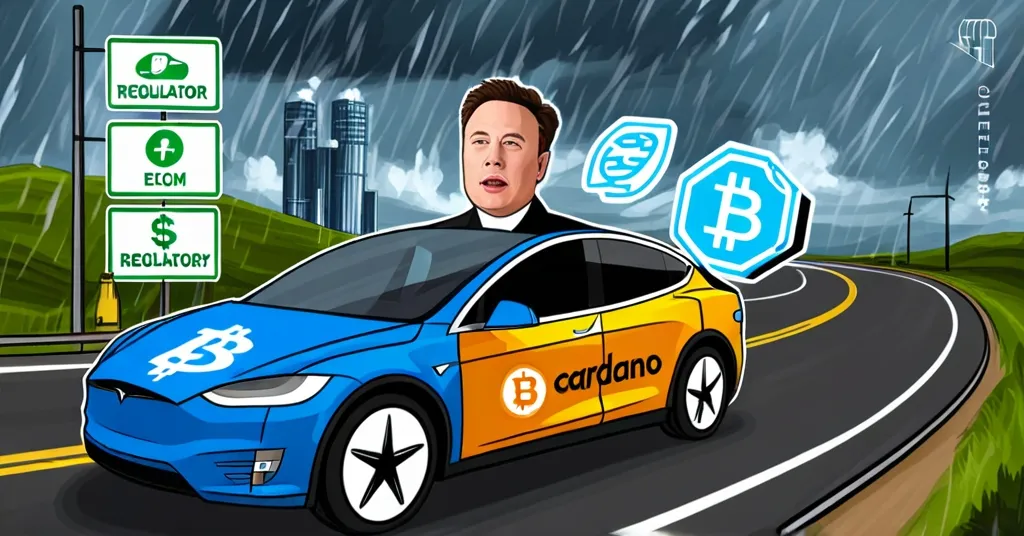Tesla’s $1.5B Bitcoin Bet: Navigating Volatility and Sustainability in Crypto

Tesla’s $1.5 Billion Bitcoin Investment: Navigating the Crypto Wild West
Tesla’s bold $1.5 billion investment in Bitcoin in 2021 signaled a new era of corporate adoption of cryptocurrencies, but it also raised questions about the sustainability and volatility of digital assets.
- Tesla invested $1.5 billion in Bitcoin in 2021
- Bitcoin’s volatility raises long-term concerns
- Alternatives like Cardano and Ripple align with sustainability goals
- Regulatory challenges loom large for crypto integration in business
When Elon Musk’s Tesla announced its $1.5 billion investment in Bitcoin back in 2021, it was like watching a high-stakes poker game where the dealer just upped the ante. Tesla, a company known for pushing the boundaries of technology, saw Bitcoin not just as a speculative asset but as a potential disruptor in the world of finance. Yet, this move into the uncertain world of cryptocurrencies was met with both admiration and skepticism.
The optimism was clear: Tesla believed in Bitcoin’s future as a revolutionary form of money. However, the reality of Bitcoin’s volatility soon hit home. In 2022, Tesla sold off some of its holdings, feeling the burn of fluctuating prices. This highlighted the risks of relying on Bitcoin as a stable business asset. The energy footprint, or the amount of energy used by the Bitcoin network, also clashed with Tesla’s eco-friendly mission. Bitcoin’s high energy consumption, estimated at 707 kWh per transaction, is a stark contrast to Tesla’s vision of a sustainable future.
This is where alternatives like Cardano and Ripple come into play. Cardano, with an energy consumption of 0.5479 kWh per transaction, is around 1,290 times more energy-efficient than Bitcoin. Ripple, with a mere 0.0079 kWh per transaction, is a staggering 8,949,267% more efficient. These cryptocurrencies align better with Tesla’s sustainability goals, offering a greener path forward.
Yet, integrating cryptocurrencies into corporate strategy isn’t just about picking the right coin. The lack of clear government guidelines on digital assets creates a murky legal landscape. This regulatory uncertainty adds another layer of risk to an already unstable market. Tesla, like other companies, must navigate this terrain carefully, updating payment systems and financial structures to accommodate digital currencies.
And then there’s the Elon Musk factor. Musk’s tweets have the power to move markets, often causing wild swings in cryptocurrency prices. His public statements on Bitcoin and other digital currencies can both bolster and undermine Tesla’s strategic moves, making it a double-edged sword in the company’s crypto journey. For instance, when Tesla suspended Bitcoin payments due to environmental concerns, Bitcoin’s value took a nosedive, showing just how much influence Musk wields.
Despite these challenges, Tesla’s foray into Bitcoin has sparked a broader conversation about the role of cryptocurrencies in corporate finance. It’s a testament to the potential of digital assets to disrupt traditional financial systems, but also a reminder of the complexities and risks involved. Tesla’s journey is a microcosm of the broader movement towards corporate adoption of cryptocurrencies, with other companies like Square and MicroStrategy following suit.
As Tesla continues to navigate the crypto wild west, it’s clear that the company is at the forefront of a financial revolution. But the road ahead is uncertain, filled with both promise and peril. Tesla’s commitment to innovation and sustainability will be tested as it balances the potential of digital currencies with their inherent challenges.
So, what can we learn from Tesla’s crypto saga? Let’s break it down:
- What was Tesla’s initial investment in Bitcoin?
Tesla invested $1.5 billion in Bitcoin in 2021.
- Why might Tesla consider alternatives like Cardano and Ripple?
Cardano and Ripple are more energy-efficient and align better with Tesla’s sustainability goals compared to Bitcoin.
- What challenges does Tesla face in integrating cryptocurrencies into its business strategy?
Tesla faces challenges due to Bitcoin’s volatility, regulatory uncertainties, and the need to update payment systems and financial structures to accommodate digital currencies.
- How does Elon Musk’s influence affect Tesla’s cryptocurrency strategy?
Elon Musk’s public statements can significantly impact cryptocurrency prices, creating both opportunities and challenges for Tesla as it navigates market reactions alongside its strategic goals.
As we watch this story unfold, it’s crucial to remember that Tesla’s journey into cryptocurrencies is more than just a financial gamble; it’s a bold step towards redefining the future of money. Whether it’s a smart move or a risky bet remains to be seen, but one thing is clear: Tesla is leading the charge in the crypto revolution, and we’re all along for the ride.



